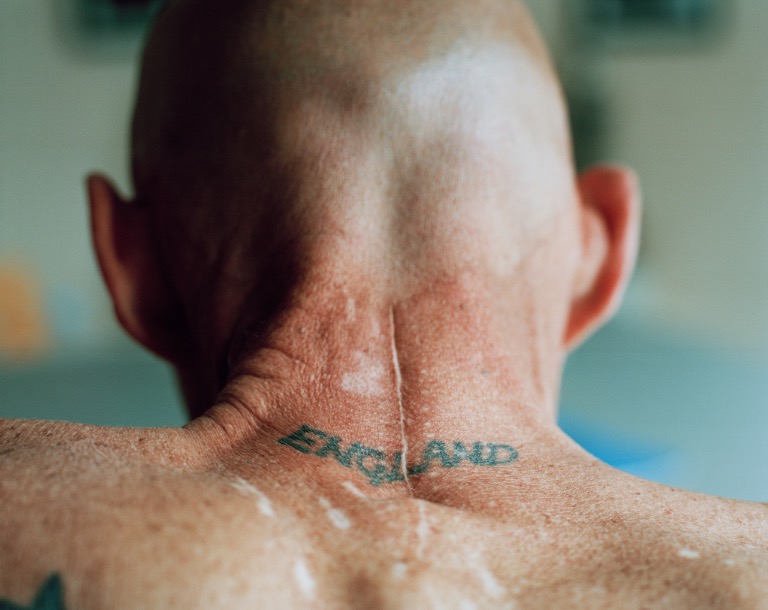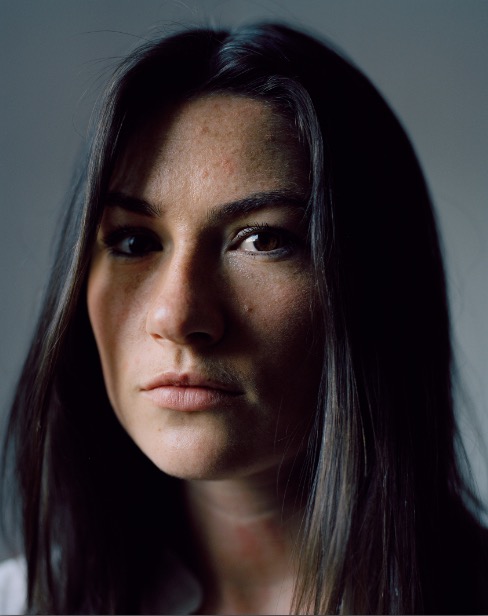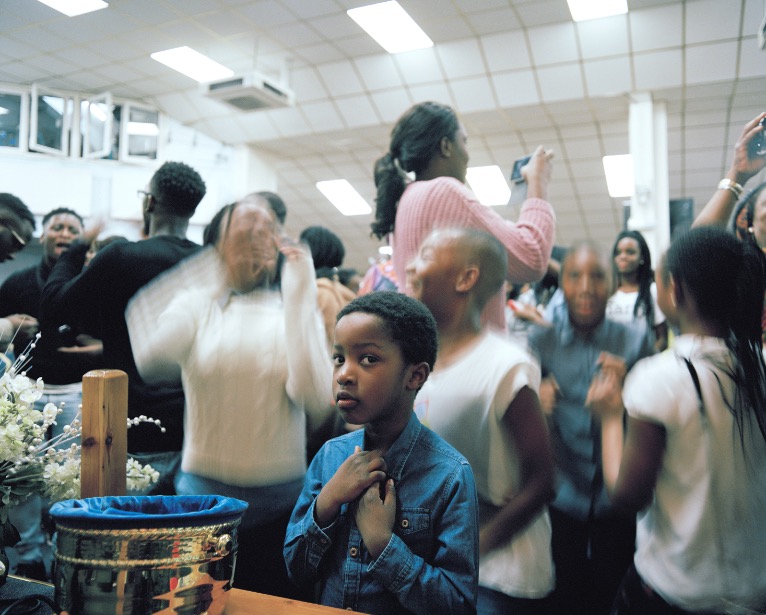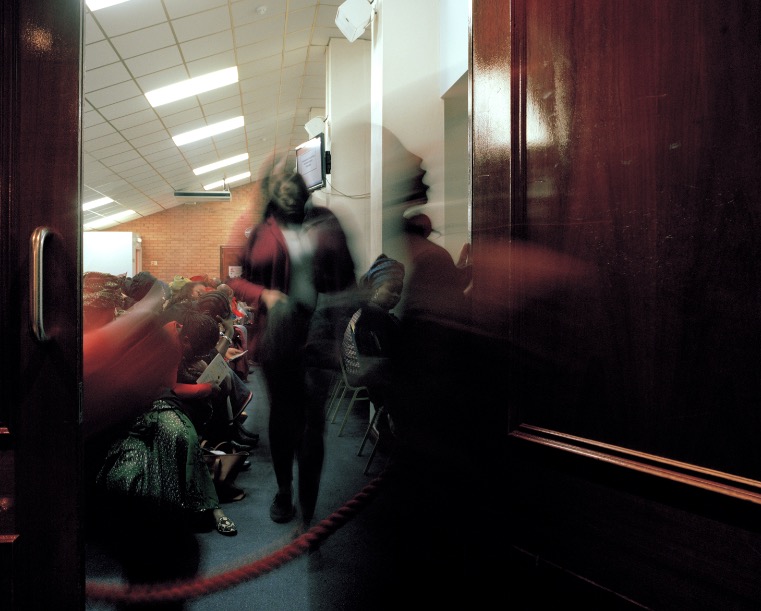Lewis Khan snaps the kind of compelling, intimate and eye-opening photographs that allow viewers a fleeting moment of insight into another person’s life. The photography graduate studied at UWE in Bristol but is now back in his hometown of London, where he is Artist in Residence at The Chelsea & Westminster Hospital. During this residency, Khan has been documenting the experiences of staff and patients at the hospital for an on-going project called ‘Our NHS’. The series offers some much needed insight into our beloved service at a time when whispers of privatisation are rife and stats can tend to overshadow personal stories. The power of these images often lies in their simplicity, as Khan captures moments of pure human emotion that invite the viewer to reflect on the subject’s circumstances. When looking at the snaps, you almost feel as though you were present at the moment the photo was taken. We just can’t get enough of Khan’s unwavering, honest and personal style, and you won’t be able to either!
Wonderland.
LENS ON: LEWIS KHAN
We caught up with up-and-coming photographer Lewis Khan to discuss his award winning take on social documentary.

From “Our NHS”




From “Our NHS”



Social documentary is something Khan has always been interested in. He won the 2014 Shuffle Film Festival short film prize for his moving portrayal of George, a man living on the fringes of South London society. Elsewhere, another recent series saw Khan capture worshippers at the ANC (All Nations Centre in Lambeth, which is a part of the Apostolic Church) on New Year’s Eve. Aside from these more personally driven projects, Khan has racked up quite the CV for someone so young, with commissions from Inventory and the FT Weekend Mag to name just a few.
Here at Wonderland, we’ll be watching this photographer’s progression carefully, as we’re expecting great things from Lewis Khan. We sat down with Khan to find out a little more about him, his work and the strengths and weaknesses in humanity that he’s so compelled to capture.


From “Georgetown”


Tell us a little bit about your residency at the Chelsea & Westminster, how did that come about?
Sure thing, so the residency came about through a competition called the Chelsea &
Westminster Photo Bursary, organised between Willis Newson in Bristol and arts charity CW+ in London. The prize of that competition was a bursary to create some new artwork for a designated ward at the Chelsea & Westminster hospital. That project went well and following that CW+ invited me to submit a proposal for a longer-term self initiated project within the hospital – this turned into the residency that I’m currently doing.
Your photos humanise the NHS at a time where much of the surrounding conversation deal with statistics. Is it important for you to remind viewers of the personal stories of the individuals using the service?
Its funny you ask that actually, because when I was first approaching the project, and my initial proposal for it, it was very much this big political project with a view that it could be a voice for the NHS as real-time events were playing out in the political sphere.
After spending a bit of time in the hospital (my first post was the cancer ward) the thing that really struck me was the amazing strength, resilience, and often humour on display in the patients and the medical staff – the people in the hospital. I started seeing them less as patients and doctors: dependants / dependees and more as being all simply people. I observed a reciprocal practice of care – medical staff taking great strength from patients, and vice- versa. I observed a wealth of knowledge offering confidence and reassurance, and I also observed times when a clear choice was not there, and simple compassion was needed. Two humans talking.
So following this the focus of the project did change a bit, the overarching theme of the NHS is still there, however now more as context for the focus of the project: the strength and the fragility of human beings.
It must be quite difficult, being party to experiences that are often the darkest for people to endure, whether it’s them or a loved one that’s unwell. How do you cope with that?
Yeah you’re right, for a lot of people its the absolute last place they want to be. Emotionally it’s been challenging for me. I discuss things a lot with people close to me. Also talking with some of the staff that I’ve grown closest to about some of the harsher realities of their job. Things that happen in the hospital can feel sad and shocking, but I’ve also found the experience weirdly grounding. Again it all comes down to this thing of all being humans, and how people cope with things: communication, empathy, interaction, all of these things I’ve witnessed and experienced flowing in all directions, and really these are the things that are shaping the project.
Photographically my approach has been to take things very slowly, often spending time shadowing in a particular dept before introducing a camera, and often after that it will still stay in my bag. That subjects dignity is not compromised is a big thing for me, both in my work generally, and in this project very acutely.
I notice that much of your work is based in social documentary. How did you get into photography in the first place and what sorts of images do you feel most to compelled to capture?
I got into photography when I was 15 in the way that i think a lot of people do, playing around with an old film camera (my dads). I started off photographing the immediate landscape and people around me – my friends and the street we all lived on. The social documentary thing is something that has developed quite naturally over time in the sense that I never set out to make that kind of work, but do find myself drawn to work with a social agenda.
Of all of your work, do you have a particular favourite piece?
That’s a hard one to say. To date Georgetown is the biggest piece of finished work I’ve done, it was also the one in which I was the most emotionally invested, so I certainly feel strongly attached to that work.
When you’re not in ‘work mode’, what kind of photographs do you tend to take from your phone etc.?
I actually got my first iPhone about a month ago, and its scary how quickly I’ve become one of those annoying people that shows you endless holiday videos when you meet up. But in general I like to think of all personal photos as a series or project of one form or another.
How did you first get into photography, and who or what are your biggest inspirations?
Really through taking pictures of what was around me, friends, urban landscape. I also used to go on big wanders or bike trips to far away bits of the city – something I should do more often. In terms of inspiration well there’s loads, some people who’s work I particularly enjoy are: Broomberg & Channarin, Pieter Hugo, Zed Nelson, Helene Binet. Then there are a bunch of mates making work London who are a constant inspiration – William Spooner, Cian Oba-Smith, Splash & Grab to name a few…
You’re a filmmaker as well as a photographer and you won 1st prize at the Shuffle Film Festival 2014 for your short film ‘Georgetown’. Can you tell us a little bit about the whole experience, from your relationship with George, the focus of the film, all the way to the one-on-one mentoring session with Danny Boyle you won?
That’s right. I stared experimenting with moving image in my last year of uni, and then
subsequently Georgetown was the first film that I made. I met George around 6 years prior to shooting the project, he lived in a half-way house at the end of my street in Vauxhall. Over time we would say hello and chat a bit in the street, eventually becoming friends. George would always tell me stories about people and places from his past, but in a way that I couldn’t quite piece together. I knew that he had spent a fair bit of time in prison as a youth / young man, and then a fair bit of later life in mental institutions. He always seemed so absorbed with the past, and so the project was really about using a camera as a way of getting to know him better, and to explore the effects of his past on his present life and self.
I’m still friends with him and see him all the time, he still lives near though not on the same street anymore. After finishing the project I spent near enough the next year entering it for competitions, exhibitions, festivals, and was lucky enough to have the film shown at The London Short Film Festival, Open City Docs, The Photographers Gallery, and then winning 1st prize at Shuffle Film Festival (which for those that don’t know happens every year in Mile End Cemetery. It’s an amazing week of music, art, and cinema. Sadly just passed this year so I can’t plug tickets but definitely worth checking out!) The judging panel was stellar – (Danny Boyle, Dexter Fletcher, Sally El Hosaini, Clio Barnard) all amazing people to put work in front of, and the prize as you mentioned was a mentoring session with Danny Boyle. That was extremely enjoyable, he is someone who’s work I’ve long enjoyed, and I thought the 2012 olympic games opening in London was extremely poignant. We met up for lunch in town, and as much as I was interested to hear about his insight and experiences he wasn’t there for that at all, and kept turning the questions back on me – what I thought, what I wanted to do, where I wanted to go. I respected that a lot.
You consistently deal with important social issues. What do you hope that viewers will take away from your work?
I certainly aspire to make work with a voice. I’m interested in social and political issues, however I’m not at all into newsy coverage or shock factor stories. I try and give time and dignity to my work, so I’d hope some of that comes across.
Beyond your Chelsea & Westminster residency, what are your plans for the future?
I’m going to keep shooting the work at the hospital for a bit longer yet, and then after that I’d like to show the work as an exhibition – so that’s the next project really.
But other than that I’ve got a project I’m going to shoot in Cuba this coming December, getting excited doing lots of prep for that at the moment. And I also really want to go spend some time on an oil rig, but haven’t got as far with those plans…


From “ANC”


Watch “Georgetown” here
To see more of Lewis Khan’s work, check out his website www.lewiskhan.co.uk